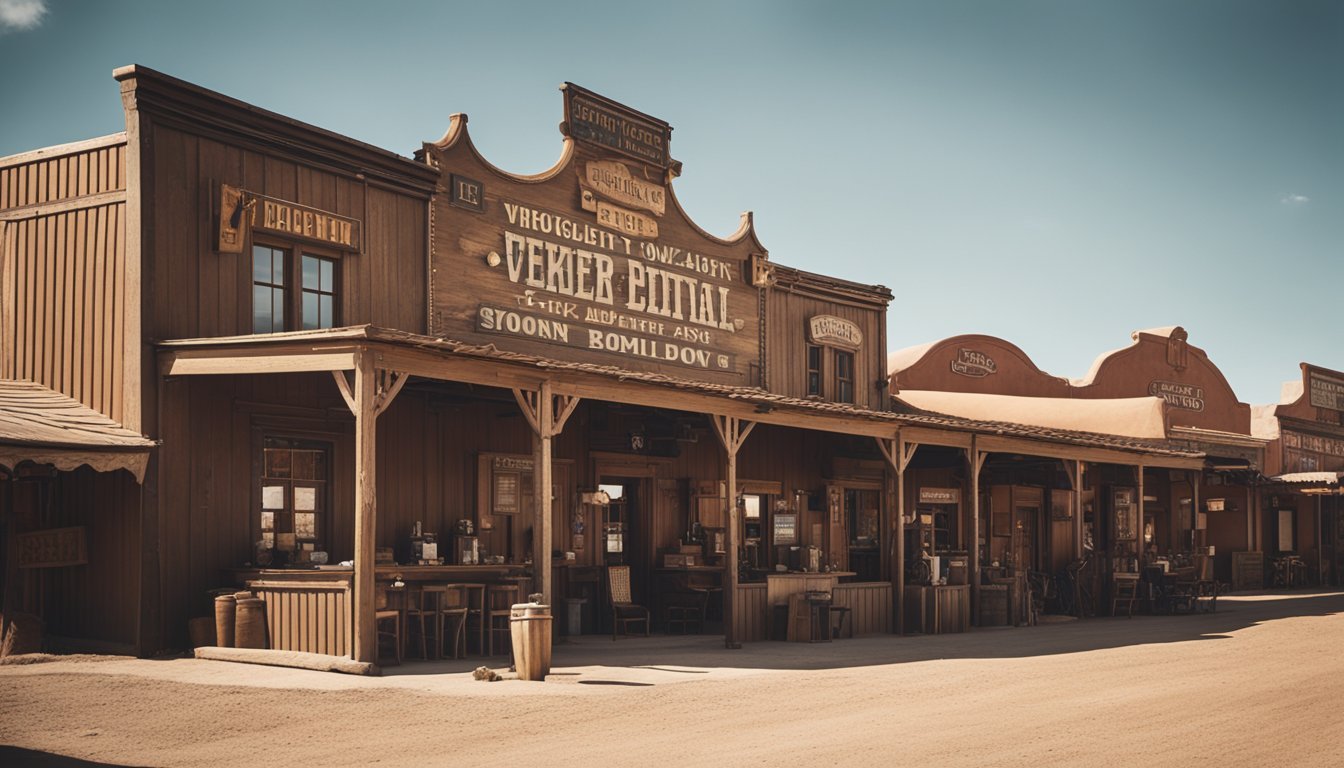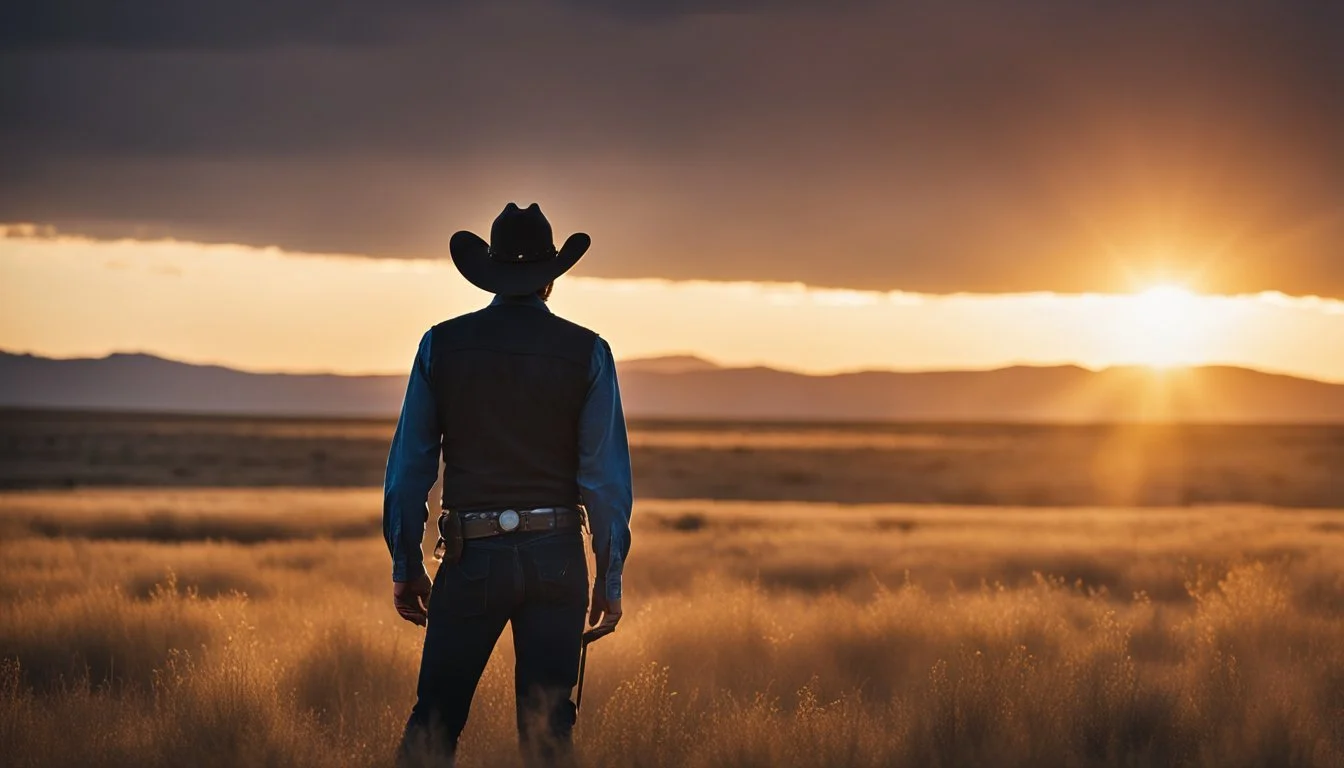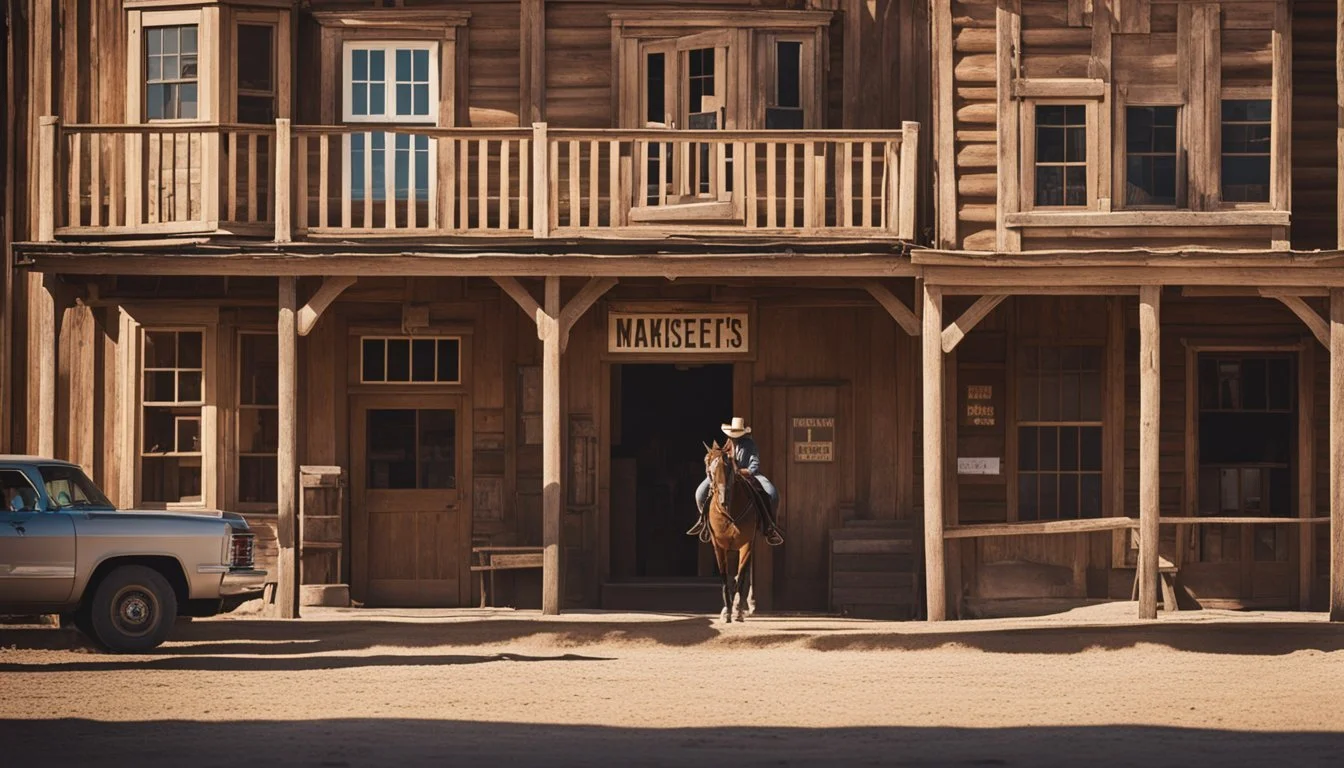8 Films Exploring James Butler Hickok's Legendary Status
Wild West Icon on the Silver Screen
James Butler Hickok, known as Wild Bill Hickok, remains one of the most iconic figures of the American Old West. His exploits as a gunfighter, lawman, and scout have captivated audiences for generations, inspiring numerous books, television shows, and films. These cinematic portrayals have played a significant role in shaping the public's perception of Hickok and cementing his legendary status in popular culture.
From early silent films to modern Hollywood productions, Hickok's life and adventures have been dramatized on the silver screen multiple times. While some movies aim for historical accuracy, others take creative liberties with the facts, blending myth and reality to create compelling narratives. This article examines eight notable films that have contributed to the enduring legacy of James Butler Hickok in cinema.
1) Wild Bill (1995)
Walter Hill's "Wild Bill" offers a gritty portrayal of James Butler Hickok's final days. Jeff Bridges stars as the legendary gunslinger, bringing a world-weary gravitas to the role.
The film focuses on Hickok's time in Deadwood, South Dakota. It explores his relationships with Calamity Jane (Ellen Barkin) and other colorful characters of the Old West.
Hill's direction emphasizes the harsh realities of frontier life. The movie blends historical events with fictional elements to create a complex portrait of Hickok.
"Wild Bill" received mixed reviews upon release. Critics praised Bridges' performance but some found the narrative disjointed. The film's atmospheric cinematography captures the rugged beauty of the American West.
Despite its flaws, "Wild Bill" remains a notable entry in the Western genre. It attempts to demythologize Hickok while still acknowledging his larger-than-life status in American folklore.
2) The Plainsman (1936)
The Plainsman is a Western film directed by Cecil B. DeMille, starring Gary Cooper as Wild Bill Hickok and Jean Arthur as Calamity Jane. Set in the post-Civil War era, the movie portrays Hickok as a heroic figure defending the frontier.
Cooper's portrayal emphasizes Hickok's sharpshooting skills and noble character. The film blends historical figures and events, though it takes significant liberties with accuracy for dramatic effect.
The plot revolves around Hickok and Calamity Jane's efforts to thwart gun-runners supplying weapons to Native American tribes. This storyline showcases Hickok's bravery and dedication to maintaining peace on the frontier.
Despite its historical inaccuracies, The Plainsman played a crucial role in cementing Hickok's legendary status in popular culture. The film's epic scale and star power helped solidify the romanticized image of Wild Bill as a quintessential Western hero.
DeMille's direction lends a grand, sweeping feel to the narrative, elevating Hickok's exploits to mythic proportions. This cinematic treatment significantly contributed to the enduring fascination with Wild Bill Hickok in American folklore.
More information on The Plainsman (1936)
3) Wild Bill Hickok: Swift Justice (2016)
"Wild Bill Hickok: Swift Justice" is a 2016 Western film directed by Dan Garcia. The movie stars Mike Mayhall as the legendary gunslinger Wild Bill Hickok.
The plot follows Hickok as he attempts to leave behind his violent past and settle into a quieter life as a lawman in a small town. His peaceful existence is disrupted when Marcus Roby and his gang of outlaws threaten the community.
Hickok must confront his inner demons and tap into his gunslinging skills to protect the town from destruction. The film explores themes of redemption and the challenges of escaping one's reputation.
With a runtime of 77 minutes, "Wild Bill Hickok: Swift Justice" offers a condensed take on the famous frontiersman's later years. The movie blends historical elements with fictional storytelling to create its narrative.
While not a major production, this film contributes to the ongoing cinematic portrayal of Wild Bill Hickok's life and legend. It showcases the enduring fascination with Old West figures in popular culture.
4) Pony Express (1953)
Pony Express portrays Wild Bill Hickok as a key figure in establishing the famed mail delivery service. Forrest Tucker brings Hickok to life alongside Charlton Heston's Buffalo Bill Cody.
The film depicts Hickok and Cody working together to create a fast mail route connecting California to the rest of the United States. They face numerous challenges, including hostile Native Americans and outlaws intent on disrupting their operations.
Set against the backdrop of potential California secession, the movie blends historical elements with fictional drama. Hickok's sharpshooting skills are prominently featured as he helps protect the Pony Express from various threats.
While taking liberties with historical accuracy, the film highlights Hickok's legendary status as a Wild West figure. It presents him as a courageous and resourceful hero, contributing to the mythos surrounding his name.
More information on Pony Express (1953)
5) The White Buffalo (1977)
The White Buffalo presents a unique take on Wild Bill Hickok's legendary status. This fantasy Western film stars Charles Bronson as an aging, haunted Hickok in his final days.
The plot centers around Hickok's quest to hunt down a mythical white buffalo that plagues his nightmares. This supernatural creature serves as a metaphor for Hickok's inner demons and past regrets.
In an unexpected twist, Hickok joins forces with Crazy Horse, played by Will Sampson. Together, they pursue the elusive beast across the frontier. This unlikely partnership adds depth to Hickok's character development.
The film portrays Hickok as a complex figure, grappling with mortality and seeking redemption. It explores themes of guilt, spirituality, and the clash between Native American and frontier cultures.
Director J. Lee Thompson creates a somber, dreamlike atmosphere that enhances the film's mystical elements. The White Buffalo offers a departure from traditional Western portrayals of Hickok, presenting him in a more introspective light.
More information about The White Buffalo (1977)
6) The Plainsman (1966)
"The Plainsman" (1966) offers a fresh take on the Wild West legend of James Butler Hickok. This made-for-television film stars Don Murray as Wild Bill Hickok alongside Guy Stockwell as Buffalo Bill Cody.
The story revolves around Calamity Jane's efforts to assist Hickok and Cody in preventing an Indian war. Abby Dalton portrays Calamity Jane, adding a dynamic female presence to the Western narrative.
Director David Lowell Rich helms this adaptation, bringing his television experience to the reimagining of Wild Bill's adventures. The film explores the complex relationships between settlers, Native Americans, and the iconic figures of the American frontier.
"The Plainsman" (1966) continues the cinematic tradition of depicting Hickok as a pivotal figure in Western lore. It offers viewers a glimpse into the legendary gunslinger's life through the lens of 1960s television production.
More information about "The Plainsman" (1966) on IMDb
7) They Died with Their Boots On (1941)
"They Died with Their Boots On" is a biographical Western film directed by Raoul Walsh. The movie stars Errol Flynn as General George Armstrong Custer and Olivia de Havilland as his wife, Elizabeth Bacon Custer.
The film presents a fictionalized account of Custer's life, spanning from his days at West Point to his final battle at Little Bighorn. It portrays Custer as a heroic and dashing figure, emphasizing his military career and romantic relationship with Elizabeth.
While the movie takes significant liberties with historical facts, it offers an exciting portrayal of Custer's life and times. The film's climax depicts the Battle of Little Bighorn, presenting a dramatized version of Custer's Last Stand.
"They Died with Their Boots On" was well-received upon its release and remains a notable entry in the Western genre. It marked the last on-screen pairing of Flynn and de Havilland, who had appeared in several successful films together.
8) Young Bill Hickok (1940)
Young Bill Hickok is a Western film that stars Roy Rogers as the titular character. Directed by Joseph Kane, the movie blends historical elements with fictional storytelling.
The plot centers on Bill Hickok and Calamity Jane as they work to thwart a foreign agent's plans. This agent leads a guerrilla band attempting to seize Western territory near the end of the Civil War.
George 'Gabby' Hayes and Julie Bishop join Rogers in the cast, adding depth to the ensemble. The film showcases Hickok's legendary status by portraying him as a heroic figure fighting against nefarious forces.
While not strictly historically accurate, Young Bill Hickok offers an entertaining glimpse into the mythologized Old West. It presents Hickok as a young, daring hero, reinforcing his legendary status in popular culture.
This movie represents one of many adaptations of Hickok's life, demonstrating the enduring fascination with his character in American folklore.
The Legacy of James Butler Hickok
James Butler Hickok, famously known as "Wild Bill," left an indelible mark on American frontier history. His legendary status as a lawman, gunfighter, and folk hero continues to captivate audiences today.
Early Life and Background
Born on May 27, 1837, in Homer (later Troy Grove), Illinois, James Butler Hickok was the fifth child of William Alonzo and Polly Butler Hickok. He received a basic education before heading west in 1855 at the age of 19.
Hickok initially traveled with his brother Lorenzo to Kansas Territory, intending to farm. However, Lorenzo soon returned to Illinois, leaving James to forge his own path.
In 1858, Hickok took his first step into law enforcement, becoming a constable in Monticello Township, Johnson County, Kansas. This role marked the beginning of his journey as a frontier lawman.
Notable Achievements and Milestones
Hickok's reputation as a skilled marksman and formidable gunfighter grew rapidly. He gained fame for his involvement with General James Lane's Free State Forces in Kansas during the tumultuous period of "Bleeding Kansas."
His ambidexterity gave him a significant advantage in gunfights, contributing to his legendary status as one of the best shots of his era. Hickok's skills and bravery led to various roles in law enforcement.
He served as a scout, spy, and lawman in different capacities throughout his career. Hickok's exploits attracted media attention, transforming him into a national celebrity and living legend.
Tragically, Hickok's life was cut short on August 2, 1876, when he was shot during a poker game in Deadwood, South Dakota. Despite his untimely death, his legacy as a frontier icon endures in American popular culture.
Cinematic Portrayals of Wild Bill Hickok
James Butler "Wild Bill" Hickok has been a popular figure in Western films for decades. Many actors have taken on the role, bringing different interpretations to the legendary gunslinger's persona.
Actors Who Have Played Hickok
Gary Cooper portrayed Hickok in Cecil B. DeMille's 1936 film "The Plainsman." Cooper's performance set a high bar for future depictions of the character. In 1923, William S. Hart starred in a silent film titled "Wild Bill Hickok," which had input from Wyatt Earp, a real-life acquaintance of Hickok.
More recently, Luke Hemsworth took on the role in the 2017 film "Hickok." This portrayal aimed to present a fresh take on the Wild West icon, focusing on his earlier years as a lawman.
Other notable actors who have played Hickok include:
Jeff Bridges in "Wild Bill" (1995)
Sam Shepard in "Purgatory" (1999)
Josh Brolin in "Jonah Hex" (2010)
Historical Accuracy in Films
While movies about Wild Bill Hickok often captivate audiences, they frequently take liberties with historical facts. Many films exaggerate Hickok's involvement in famous gunfights or embellish his personal relationships for dramatic effect.
Some productions strive for authenticity in costumes and settings but may still alter timelines or combine events for narrative purposes. The 1995 film "Wild Bill" attempted to balance myth and reality, incorporating both legendary tales and documented facts about Hickok's life.
Filmmakers face the challenge of portraying Hickok's complex personality, which included aspects of lawman, gambler, and showman. This multifaceted nature often leads to diverse interpretations across different movies.
Impact of Hickok's Myth on American Culture
James Butler Hickok's legendary status has left an indelible mark on American culture, shaping perceptions of the Old West and influencing popular media for generations.
Hickok in Western Folklore
Hickok's reputation as a skilled gunfighter and lawman cemented his place in Western folklore. His exploits, both real and exaggerated, became the stuff of campfire tales and dime novels. These stories painted Hickok as the quintessential frontier hero - brave, deadly accurate with a pistol, and committed to justice.
Hickok's distinctive appearance, with his long hair and flamboyant style, became iconic. This image inspired countless depictions in art, literature, and early films. His legendary quick-draw ability and supposed involvement in numerous gunfights fueled the public's fascination with the Wild West.
Modern Interpretations
In contemporary media, Hickok's legacy continues to evolve. Modern portrayals often aim for a more nuanced depiction, exploring the man behind the myth. Films and TV shows delve into Hickok's personal struggles, relationships, and the toll of his violent lifestyle.
Some recent interpretations challenge the traditional hero narrative, presenting Hickok as a complex figure shaped by his era. These portrayals examine the psychological impact of violence and fame on the man known as "Wild Bill."
Hickok's story has also been used to critique the romanticization of the Old West, prompting discussions about the realities of frontier life and the nature of heroism.





